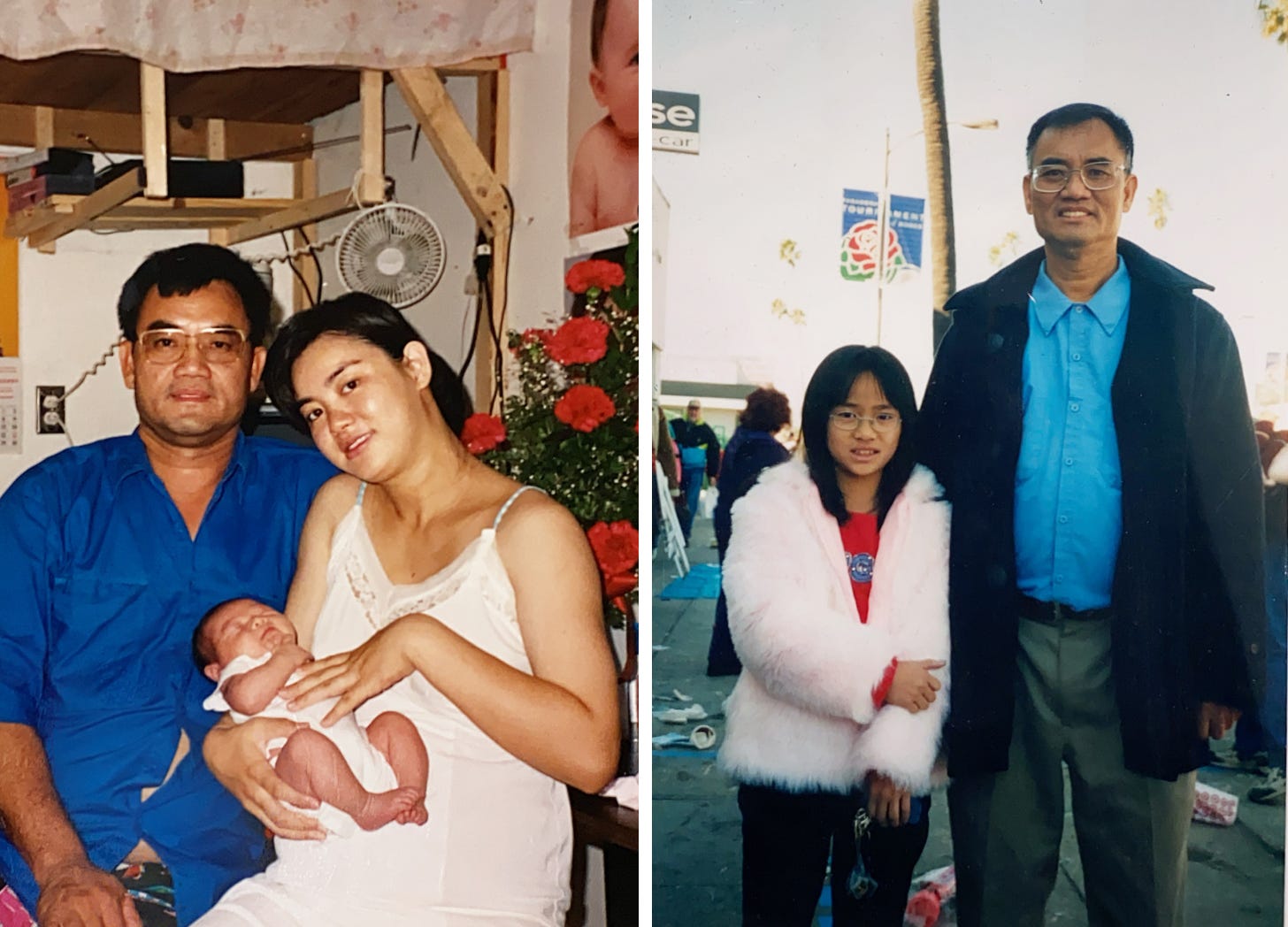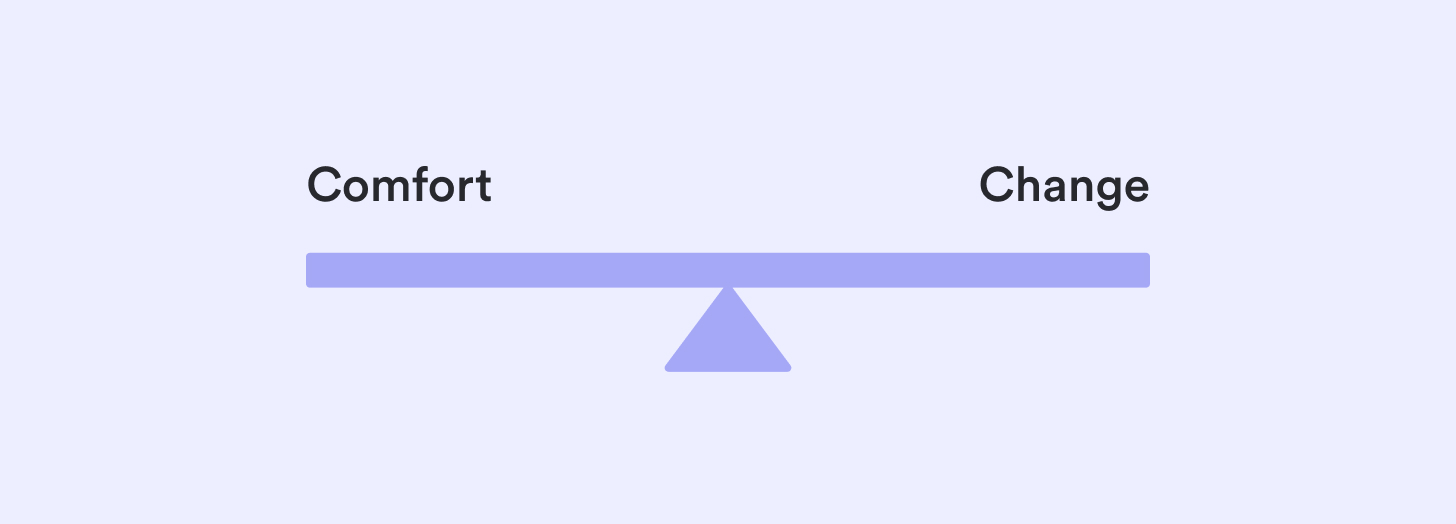Redefining What Stability Means To Me & Thriving Because Of It
How my upbringing and lived experiences have shaped my unconventional yet personal definition of stability
Divergent Paths To Stability: External vs. Internal Constancy
“Well, I value stability. I’m trying to stay in this area, and I want to settle down in a few years,” my ex expressed at the end of our relationship. My ex’s words cast a shadow of doubt, and I felt ashamed. Was I the immature one for wanting to challenge myself with new experiences, like moving to New York City before settling down? Was I at the “wrong” life stage? I felt pulled apart from the tension between us and within myself. Stretching beyond what might have seemed like a difference in life stages until it broke was the greater truth behind our incompatibility — our clashing definitions of stability. What once pulled us together, our shared passion for social impact, wasn’t enough anymore. We became like two magnets with opposing poles.
His definition of stability was rooted in constant external factors, relating more to the traditional understanding of maintaining the same job, friends, interests, or city. This definition provided a valid feeling of safety and a sense of home. However, I defined stability as an equilibrium achieved by constants from within, such as perseverance, amidst change.
Breaking free from the tension — between holding onto societal definitions of stability and feeling obligated to keep a comfortable relationship — released me into a vast sea of possibilities. But that wasn’t without its storms and hurricanes; I joined a 7-person startup last year, naively believing there would be a 2-5 year runway, only to be let go after nine months.
In my post-breakup voyage, the push and pull of these treacherous waters only reminded me of the conflict I once navigated in my childhood of loss and the constant switching of homes. Rather than fight against the current called change, I learned to move with it and adapt — becoming the stillness, the eye of the storm. The breakup wasn’t just about letting go of the old, comfortable, and familiar. It was about choosing myself and my happiness rather than a prescriptive notion of stability.
Living a Thriving Life On My Own Terms and Ideals
Though it was I who initiated the breakup, the loss of my ex’s presence was like losing the air to breathe. One day, my ex and I were living together; the next day, he was gone. Now, silence filled the space, but it was rather liberating. His questioning of my life choices and my need to cater to his views was absent. That space wasn’t a void. It was freedom awaiting me to breathe it, and as I did, I felt a surge of energy. It was like re-igniting a forgotten, rusty Mercedes and taking it out for a joy ride. I rediscovered the drive to live without inhibitions — smiling and laughing more often. My friends, family, and therapist noticed I seemed more “me.”
I eventually conquered grad school, founded businesses spun up from late-night brainstorming sessions, and wandered the streets (probably looking for pizza) of my new home — New York City. I dyed my hair pink. I got a quarter-sleeve tattoo. Yet, I still found a sense of stability and contentment amidst this landscape of changes — and I still have plans to settle down with my current partner. You might be wondering, how on earth was this even possible? Society might deem me “immature” or “reckless,” but I see my past decisions as celebrating my individuality and ideals. I’ve gotten to this point by taking a journey back to the past, reflecting on the early roots that made it so hard for my ex and me to let go of our respective definitions of stability.
The Roots of Our Stability: Family, Upbringing, and Change
Stability played contrasting roles in my and my ex’s upbringings. My ex grew up with the warm embrace of familiar surroundings, such as a tight-knit family. Since his family and high school friends had always been just an hour away, he felt everything he needed was right in his corner. As much as I admired him for his immense gratitude, we struggled to match each other’s appetite for change.
Venturing out on a snowboarding trip with me just a few hours away from his hometown was considered a risk to him, even though his life was relatively unchanged. His perception was valid, given that what’s “risky” is subjective. However, it was smaller in magnitude compared to my idea of risk. I knowingly shook my world like an earthquake by leaving my secure job to pursue my entrepreneurial dreams. Fuck it, I did it anyways because I had trust and confidence in myself to navigate uncertainty. I knew that I was capable of finding another job if I failed. I was my shelter, one that would stand tall and strong when landscapes would change.
Home for me was always ever-changing; I lost my parents by the age of 10 and changed families several times. Struggling to feel like I belonged where I lived, I found refuge in havens elsewhere, like finding a sense of family through my friends’ families. They often reminded me that I was a strong and resilient woman, which is what I struggled to see within myself. How they treated me became how I learned to treat myself better. As my confidence grew, so did the belonging I had to myself. I would tell myself that I was enough and had a bright future ahead of me. My positive mindset helped me focus on what I could control, like investing in extracurriculars to get into college.
In complement to my chaotic circumstances is my dopamine-chasing, neurodivergent mind. Taking risks sends an invigorating rush of adrenaline and excitement that breaks me from stagnation. Seeking experiences outside of my immediate world is not just due to my upbringing but also my mental disposition (ADHD), making it easier to achieve stability amidst the newness I create in my life.
The Role of Personal Stability When Navigating Job Loss
Flash forward 15+ years later, losing my job unexpectedly last year tested my perseverance, the shelter I developed throughout my childhood. I recall staring blankly at my computer screen as I was trying to prepare for job apps. I was ugly crying while my thoughts of self-doubt and financial anxieties clouded my ability to think; I said out loud, “I can’t do this.” Too intimidated to take action then, I allowed myself to step away and gather my thoughts. I came the next day better rested and with a renewed sense of determination. Like building a house brick by brick, I focused on small tasks instead of stressing about the mountain of future ones.
I would play video games for breaks. I traveled to Seattle with friends to feel refreshed. I would often go outside for a peaceful walk on the day-to-day. Eventually, small wins stacked like legos into a big win; I landed a job at Netflix more than a month after my layoff. Today’s crumbling job market shows how unreliable it can be to depend on the stability of external factors. What you can rely on is yourself; you’re the one who will rebuild your life when it feels like the world is tearing you down.
The Importance of Balancing Comfort vs. Change
As much as I am self-confident that I can handle change, I, too, value comfort and predictability. Imagine if I was always fighting a hurricane; I’d grow tired and drown. But, if I never ventured past the shores, I’d miss out on the adventure called life. Going through the job search twice was an endless odyssey with an overdue trip back home; I want a more stable work environment in the near term. Comfort and change, as aspects of stability, aren’t so black and white — you want one but not the other. It’s the ebb and flow of exploring the seas and returning to shore.
Challenges in Upholding My Stability
Despite having a history of developing my definition of stability, there were times when I’d lose sight of it. Guilt blinded me despite being able to see how doting my partner was to me. When my friends echoed the sentiment, “But he’s stable. Why break up?” I felt the pressure to conform to their traditional views on stability. What more could I have asked for? Mainly because he was the embodiment of what every Asian mom wanted. Even my stepmom dared to call my ex’s mom to help rekindle the relationship.
Hearing the frustration in my voice as I was defensive towards my friends, they concluded, “Jen, what matters most is what makes you happy. It’s your life, not ours.” At that moment, their words illuminated their reassurance and encouraged me to focus on what my heart desired — even though we weren’t aligned on what we valued in a partner. I wanted a partner who “gets me.”
Finding a Partner Who Shares My Vision of Stability
Leaving behind what was “ideal” to others was daunting, but it led me to my current partner. It opened my eyes to how freeing love can be. Together, we’ve embarked on journeys of self-discovery and growth, constantly challenging our status quo. Whether it’s relocating to New York together, him founding his college admissions consulting business, or me starting this blog for self-expression, we actively encourage and propel each other forward, building momentum in our lives as we sail through life’s uncertainties.
Charting Your Own Path, Redefining Stability on Your Terms
In sharing my journey, I invite you to explore stability and define it on your terms. May you embrace change rather than avoid it, with your innate stability steering you through uncertainty and growth. Also, take the time to learn the “why” behind someone’s definition. We might judge them less, connect with them more, expand our perspectives, or be more content in the long run.
What is your definition of stability? What has shaped that definition for you? Have you ever felt pressured to conform to someone else’s or society’s definition? Feel free to respond in the comments section.
Thanks for reading Just JWong! Subscribe for free to receive new posts and support my work.






Hi Jennifer, I sense your strength of character in your words and journey, your personal truth-saying, and your loyalty to your authenticity. Inspiring.
While my own journey may have looked 'traditional', I've confounded expectations and labels, especially now that I resigned from a 'big job' to be a caregiver. None of that matters, when you can walk your 'Why', stay true to personal values (that may shift but are yours), and be yourself. But you already know this, based on this article - so COOL!
I'm curious to learn more.
A very insightful article with many different angles! I think you will be very successful here! Keep up the good work! 💙